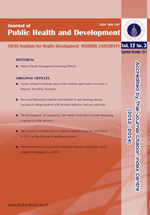Health situation of Akha Hill Tribe in Chiang Rai Province, Thailand
Main Article Content
Abstract
Akha is one of six main hill tribe groups living in northern Thailand, and approximately 150,000 persons in 2014. This study was to assess the Akha population health status who lived in Chiang Rai province. A cross-sectional study design was applied. Totally, 550 participants were recruited into the study by a cluster sampling from 20 of 243 Akha villages from Chiang Rai Province, Thailand. Participants were grouped into 8 aged clusters; 0-1 year old, 1-5 years old, 6-12 years old, males aged 13-25 years old, females aged 13-44 years old, males aged 26-60 years old, females aged 45-60 years old, and aged ≥ 60 years old. Data were obtained by validated questionnaires which included general information, history of vaccination, child development assessment, child and mother health assessment, and family planning, etc.
Results showed among chlidren aged < 1 year old; 30.0% received Measle Mumps, and Rubella (MMR) vaccine, 70.0% received the 3rd dose of Diptheria, Tetanus, and Pertussis/ Polio vaccine (DTP/OPV). Children aged 1-5 years old; 90.0% gave birth at home, 40.0% received the 5th dose of DTP/OPV, and only 4.0% had been assessed health development regarding to the Ministry of Public Health (MOPH) protocol Children aged 6-12 years old; 22.04% had health development assessment, 66.0% had dental carries. Men aged 13-25 years old; 28.0% smoked, 18.0% drank alcohol and 26.0% used marijuana, 64.3% had sexual experience before aged 16 years old. Women aged 13-44 years old; 56.0% were illiterate, 50.0% did not receive antenatal clinic (ANC) during their pregnancies, 64.3% gave birth at home by un-trained midwives, 7.1% received three doses of Tetanus Toxoid (TT) during pregnancy, 12.5% had been screened a PAP smear. Men aged 26-60 years old; 78.0 % were illiterate, 28.0% could not communicate in Thai, 62.0% smoked, 64.0% drank alcohol. Women aged 45-60 years old; 92.0% were illiterate, 92.0% could not communicate in Thai, 84.0% ate raw food. Those aged ≥ 60 years old; 100.0% were illiterate and 74.0% could not communicate in Thai.
Akha people in Thailand are having many risk behaviors and difficulty accessing health care due to language barrier. There is an urgent need to develop a proper health promotion program to reduce susceptibility to diseases.


